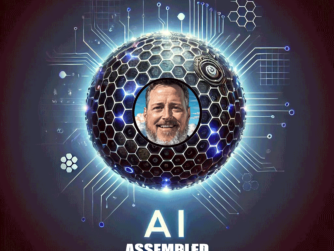
AI Assembled 042525
Season 02, Episode 9
AI Assembled is a cutting-edge podcast where AI takes center stage. Hosted by Chris Doelle, the show features content sourced by ChatGPT, Grok, Claude, Deep Seek, Manus and others and expertly crafted into engaging discussions through NotebookLM. Each episode dives into the latest developments in artificial intelligence, blending human insight with the power of machine-generated storytelling. Tune in to explore how AI is reshaping industries, all with the help of innovative AI tools working behind the scenes.
Guard Rails or Roadblock? The Future of AI at Work Hangs on California’s SB7
In this episode of AI Assembled, host Chris Doelle sets up a discussion to take a close look at California’s proposed Senate Bill 7, also known as the No Robo Bosses Act.
The mission is to unpack what SB7 is exactly, where it currently stands in California’s legislative process, and the potential impact it could have on businesses operating in California compared to businesses elsewhere in the US if it ultimately passes. The discussion draws on insights from official analyses, news reports, and perspectives from both supporters and opponents of the bill.
Understanding SB7: The “Employment Automated Decision Systems” Bill
- At its core, SB7 is about regulating how companies use AI, specifically systems referred to as “automated decision systems” (ADS), when making workplace decisions.
- Introduced by Senator Jerry McNerney in December 2024, the main goal of SB7 is to ensure transparency and accountability when employers use AI for decisions that affect employees and job applicants.
- The idea is to find a balance: allow innovation with AI while also protecting workers’ rights and making sure automated systems aren’t unfairly deciding someone’s livelihood.
- Importantly, it is not an outright ban on AI bosses. Supporters would argue it’s more about putting up necessary “guard rails” for the use of these automated systems.
Why Is SB7 Being Proposed Now?
- The primary driver is the significant extent to which employers are already using AI. This isn’t just for simple tasks, but for actively monitoring, evaluating, managing workflows, performance reviews, and even making decisions about discipline or termination based on algorithms crunching data.
- A 2024 survey suggested that around 40% of workers have experienced some form of algorithmic management.
- This survey also highlighted a striking and concerning disparity: algorithmic management affects workers of color much more, impacting 63% of Black workers and 52% of Latino workers, compared to approximately 35% of White workers. This significant difference immediately raises flags about fairness and potential bias.
- A core concern fueling SB7 is the worry that relying too heavily on these automated systems (“robo bosses”) could amplify discrimination.
- Beyond discrimination, there are fears of other potential problems such as lower pay (if everything is hyper-optimized), unsafe conditions (if AI sets impossible quotas), and unfair firings without human context or review. Examples cited include reports related to Amazon’s algorithmic productivity quotas and automated firings tied to those metrics.
- Another angle is the rise of AI predictive tools, such as one mentioned called Terram, which analyze vast amounts of employee data. This can sometimes include personal information like off-duty activity, financial info, or social media. These tools attempt to predict risks like potential fraud or even loyalty.
- This predictive data use raises major privacy concerns. There’s also the risk that decisions could be made based on data that is irrelevant to the job or simply wrong.
- In summary, the rapid spread of AI management, its unequal impact on different demographic groups, and the potential for bias and privacy invasion are the fundamental reasons “why now” for SB7.
Key Specific Rules Proposed by SB7
SB7 outlines several specific requirements for California businesses using automated decision systems in employment:
- Advanced Notice: Employers would be required to give written notice 30 days before implementing an ADS that impacts employment decisions. This notice must go to both current employees and job applicants and must list the specific ADS tools the employer plans to use.
- Limits on AI-Only Decisions: This is described as a “really big one”. The bill states that employers cannot rely solely on an automated system for high-stakes decisions such as hiring, promotions, discipline, and termination. These critical decisions demand meaningful human involvement, independent review, and actual corroborating evidence. It essentially bans decisions made primarily by an algorithm without a human check. The idea is that a human must always be in the loop and have the final call on important matters.
- Ban on Certain Predictive Surveillance & Sensitive Data Use: SB7 would prohibit employers from using ADS to guess or predict worker behavior based on sensitive personal data (like off-duty activity, health, or finances) if doing so invades privacy or could be discriminatory. It also bans seeking sensitive personal information that is not relevant to performing the job.
- Data Access and Correction Rights: Workers would gain the right to see the data the ADS has collected and used about them. If that data is wrong, they can request corrections. This is seen as crucial for fairness.
- Notice of AI Influence and Right to Appeal: If an ADS influenced a decision affecting a worker (even if it wasn’t the sole factor), the worker must be notified of the AI influence. The worker gets 30 days to appeal this decision. The employer then has 14 business days for a human reviewer to take another look. If the appeal is successful and the decision is found to be unjustified, the employer has 21 days to rectify the decision. This establishes a formal process.
- Human Accountability: The bill requires there to be a specific human decision-maker who is ultimately responsible for decisions and has the ability to override the AI’s recommendation. This prevents employers from “hiding behind the algorithm”.
- Anti-Retaliation: Standard protections are included to prevent workers from being penalized for exercising their rights under SB7.
- Enforcement and Penalties: Enforcement is handled by the Labor Commissioner. Workers, their representatives, or public prosecutors can sue. Penalties are set around $500 per violation.
- Local Laws: SB7 does not block local laws. It sets a floor, meaning local jurisdictions in California could potentially enact stricter rules.
Arguments from Supporters of SB7
- Supporters emphasize that algorithmic management is a present reality, not science fiction, citing the 40% survey figure.
- They point to real-world examples (like Amazon and predictive tools) as proof that harm, including fatigue, burnout, unfair job loss, and discrimination, is already happening.
- They argue the bill is necessary to protect basic workers’ rights, dignity, and ensure fairness.
- Supporters believe humans provide essential context and empathy that algorithms simply lack.
- They contend that existing anti-discrimination laws are insufficient on their own without the transparency mandated by SB7, because you can’t challenge what you can’t see.
- They frame the bill as balancing innovation with accountability – allowing AI to be used but with necessary guard rails.
- The argument is made that the cost of not regulating biased or unfair AI could be much higher in the long run.
- Lorena Gonzalez from the California Labor Federation is cited as clearly stating the core principle: critical decisions affecting a person’s job and safety should have human oversight.
Arguments from Opponents of SB7
- Opposition, primarily from the business community, raises several concerns, a big one being that the bill is too broad.
- They argue it covers virtually all businesses (large and small) and could apply even to AI uses considered low-risk.
- Opponents foresee major administrative headaches and costs for businesses, citing requirements like the 30-day notice and setting up/managing the appeals process.
- They worry about the potential for increased lawsuits, which they argue could eventually lead to higher costs for consumers.
- There is a significant fear that the bill could stifle innovation, making businesses hesitant to adopt new automated tools, even those that might be beneficial, due to the perceived regulatory hurdles.
- Opponents push back by saying that existing laws, such as California’s Fair Employment and Housing Act (FEHA), already prohibit discrimination.
- Some opponents even argue that well-designed algorithms might actually reduce bias in certain situations compared to individual human managers.
- They feel SB7 is a “one-size-fits-all sledgehammer” and would prefer a narrower, more targeted approach focusing only on the highest-risk AI uses, such as AI firing someone without any human review.
- The California Chamber of Commerce is noted as being particularly critical, calling the requirements impractical for businesses of all sizes and labeling the bill a “cost driver”. They advocate for a much more tailored approach.
Potential Impact If SB7 Passes
If SB7 were to pass more or less in its current form, the impacts could be substantial:
- For Employers in California: There would be significant adjustments and new compliance steps required. This includes managing the notice process, handling data requests, and running the appeals system. This would likely mean more HR work, potentially requiring more staff, training, or new technology to ensure AI systems are transparent and auditable. Businesses would probably become more cautious about rolling out AI for decision-making and might implement more internal checks. A potential upside is that by forcing checks, it could lead to catching bias earlier, which might save trouble (like lawsuits) down the line. Overall, expect a definite shift towards more transparent and accountable AI use in California workplaces.
- For Workers in California: It could mean clearer rights. Workers would know when AI is being used, understand how it might affect them, and have a formal way to challenge decisions they believe are unfair. The hope is for potentially more job security, more fairness, the possibility of reversing mistakes or injustices through the appeal process, and less feeling like a “cog” being watched by an algorithm, thus reducing dehumanization. It might encourage employers to use AI more thoughtfully. It could also potentially help narrow some of the demographic biases that have been observed.
- Nationally: California often sets trends. If SB7 passes, California would become a leader in regulating workplace AI. This would create a patchwork of regulations across the US, with a tougher climate in California than in many other states. Opponents raise the potential tradeoff that this could make companies hesitant to operate or hire in California due to added compliance costs and potentially slower processes. However, if the bill is successful and effectively balances innovation with worker rights, other states (or even the federal government) might look to California’s model. It could absolutely set a major precedent for labor law in the age of AI. The actual impact depends significantly on how smoothly it is implemented and the real-world outcomes.
Current Legislative Status (as of late April 2025)
- SB7 was introduced in the Senate in December 2024.
- It passed the Senate Labor Committee in early April 2025.
- It has since moved to the Senate Judiciary Committee.
- A hearing was scheduled for the Senate Judiciary Committee on April 29th, 2025.
- The bill still needs to clear the Judiciary Committee, pass a full vote in the Senate, then go through the entire process in the State Assembly (including committees and a floor vote), and finally reach the Governor’s desk for signature.
- Its future is still uncertain, and there are likely many negotiations happening behind the scenes.
- However, the bill’s progress indicates that policymakers are taking the issue of AI in employment very seriously. The outcome in California could significantly shape the national conversation around this topic for years to come.
In Summary
SB7, the No Robo Bosses Act, in California aims to bring transparency, human oversight, and worker rights into the growing use of AI-driven workplace decisions. It faces substantial pushback from businesses concerned about the practicalities, costs, and potential for hindering innovation. The bill is still actively moving through the California legislature, with the judiciary committee hearing being a key step, and the path ahead remains long and uncertain. As noted, “the story of AI regulation at work is definitely still being written”. The episode concludes by highlighting that as AI becomes more integrated into our lives, the fundamental question arises: what safeguards are needed to ensure this powerful technology serves everyone fairly and equitably across society?
Stay connected with AI Assembled and keep an eye on how this important bill develops. For more resources on business growth, check out the Business Success Academy at freshmediaworks.com.
If you would rather get this as an email newsletter, head here: https://www.freshmediaworks.com/assembled
Subscribe so you never miss an episode:
- Spotify: https://open.spotify.com/show/48q8bOBoLwOHPG449CS3QF
- Apple iTunes: https://podcasts.apple.com/us/podcast/ai-assembled/id1773890257


